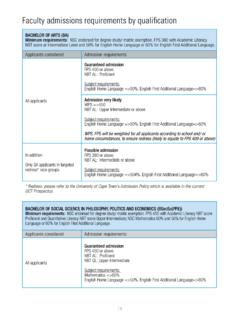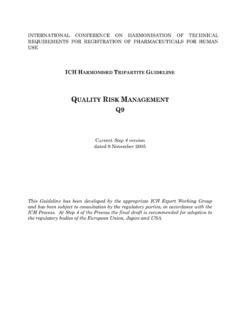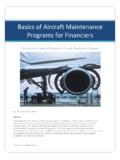Transcription of POVERTY, INEQUALITY AND THE NATURE OF ECONOMIC …
1 POVERTY, INEQUALITY AND THE NATURE OF ECONOMIC GROWTH IN SOUTH AFRICAHAROON BHORATCARLENE VAN DER WESTHUIZENDPRU WORKING PAPER 12/151 NOVEMBER 2012 POVERTY, INEQUALITY AND THE NATURE OF ECONOMIC GROWTH IN SOUTH AFRICA DEVELOPMENT POLICY RESEARCH UNIT HAROON BHORAT Development Policy Research Unit CARLENE VAN DER WESTHUIZEN Development Policy Research Unit Working Paper 12/151 ISBN 978-1-920055-92-9 November 2012 University of Cape Town 2012 This work is licenced under the Creative Commons Attribution-Non-Commercial-Share Alike South Africa License. To view a copy of this licence, visit or send a letter to Creative Commons, 171 Second Street, Suite 300, San Francisco, California 94105, USA.
2 ABSTRACT The post-1994 period in the South African economy is characterised, perhaps most powerfully, by the fact that the economy recorded one of its longest periods of positive ECONOMIC growth in the country s history. One of the more vexing issues within the ECONOMIC policy terrain in post-apartheid South Africa though, has been the impact of this consistently positive growth performance on social welfare. Many observers have highlighted the potentially harmful consequences of persistently high levels of poverty and particularly, ECONOMIC INEQUALITY on the quality and sustainability of democracy.
3 The evidence suggests, at best, six key trends which are noteworthy in terms of observing changes and challenges in South Africa s second decade of democracy. Firstly, it is clear that both absolute and relative levels of poverty have fallen for African- and female-headed households. And it is a result invariant to the choice of poverty line. Secondly though, we continue to show that race and gender remain overwhelming determinants of this poverty profile. Thirdly, the trends in income INEQUALITY suggest that one of the world s most unequal societies has quite possibly become the most unequal.
4 In turn, and our fourth key deduction, it is evident that income INEQUALITY between racial groups to all intents and purposes between Africans and Whites is driving this overall increase. Our analysis of the NATURE of ECONOMIC growth since 1995 suggests that despite positive ECONOMIC growth, individuals at the top-end of the distribution have gained the most from the post-apartheid growth dividend. Indeed, what this suggests is that the country s current democratic growth model is crafted around supporting incomes at the bottom-end of the distribution through an extensive social transfer programme, whilst offering few returns to those in the middle of the distribution.
5 It is not evident, as South Africa enters its first post-1994 recession with declining tax revenues and rising fiscal deficits, whether such a growth model is indeed desirable or sustainable. JEL Code: I3 Keywords: Poverty, INEQUALITY , Social Transfers Acknowledgements The research, from which this paper emanates, was originally commissioned the Presidency. Disclaimer The Working Paper series is intended to catalyse policy debate. They express the views of their respective authors and not necessarily those of the Development Policy Research Unit (DPRU). CONTENTS 1. INTRODUCTION 2 2.
6 SHIFTS IN POVERTY UNDER DEMOCRACY 3 3. INCOME INEQUALITY UNDER DEMOCRACY 8 4. THE NATURE OF ECONOMIC GROWTH: 1995-2005 12 5. DETERMINANTS OF GROWTH IN EXPENDITURE OF THE POOR SINCE 1995 17 6. CONCLUSION 20 REFERENCES 22 APPENDIX 23 DPRU WORKING PAPER 12/152 2 1. INTRODUCTION During the first decade of democracy in South Africa, the economy has recorded one of its longest periods of positive ECONOMIC growth in the country s history. One of the more vexing issues within the ECONOMIC policy terrain in post-apartheid South Africa though, has been the impact of this consistently positive growth performance on social welfare, specifically income poverty and INEQUALITY .
7 Many observers have highlighted the potential harmful consequences of persistently high levels of poverty and, particularly ECONOMIC INEQUALITY , on the quality and sustainability of democracy (See for example Bermeo, 2009; Kapstein & Converse, 2008 and Wells & Krieckhaus, 2006). High levels of INEQUALITY have been linked to behaviours such as decreased voter turnout, depressed political engagement and high crime rates all of which can have a negative impact on the quality of democracy. Increasing levels of income INEQUALITY also have the potential to divide citizens and contribute to social conflict.
8 In such a situation, the diverse pressures on a government can lead to politicians resorting to surreptitious tactics such as playing some voters off against each other (Bermeo, 2009). Empirical evidence from across the world confirms that persistent high levels of INEQUALITY have resulted in serious challenges to democracy. Specific outcomes range from a decline in the willingness of citizens to support democracy to actual reversal of democracy. Wells & Krieckhaus (2006) analyse how a range of individual personal characteristics and attitudes as well national ECONOMIC and political variables influence democratic support in a sample of 35 countries (including countries in Western and Eastern Europe, Latin America, Asia and also South Africa).
9 One of their key findings is that ECONOMIC INEQUALITY has a highly significant, negative influence on citizens willingness to support democracy. Kapstein and Converse (2008) investigate democratisations between 1960 and 2004 in 88 different countries. They find that INEQUALITY was significantly higher in democracies that eventually underwent a reversal (in other words, democracy failed). They also conclude that ECONOMIC growth is not enough to ensure the sustainability or consolidation of democracy and that the extent to which ECONOMIC growth has benefited all citizens is the key to the sustainability of democracy.
10 In other words, the distribution of income, assets and opportunities is important for the survival of a democracy. They do, however, recognise that other factors also contribute to the survival of a democracy, including the quality of political institutions. Fukuyama (2008) investigates the role of high levels of INEQUALITY in the destabilisation of politics in Latin American democracies over the past decade, discussing numerous examples where persistent levels of INEQUALITY have given rise to disruptive social movements and social conflict. In an article focusing on democracy in Africa, Lewis (2008) describes the phenomenon of growth without prosperity in Africa s new democracies and warns that the divide between popular expectations and ECONOMIC realities can harm the consolidation of democracy in these countries.





